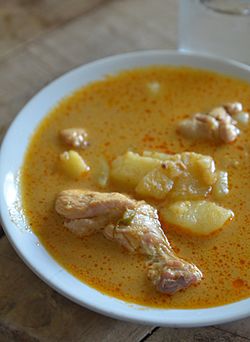Yellow curry facts for kids

Yellow curry with chicken and potatoes
|
|
| Alternative names | Kaeng Lueang |
|---|---|
| Type | Thai curry |
| Place of origin | Southern Thailand |
| Main ingredients | |
Yellow curry is a delicious and popular dish from Thailand. It's a type of curry that gets its bright yellow color from a special spice called turmeric. This curry is known for being milder than many other Thai curries, which means it's not as spicy.
It's made from a mix of tasty spices like cumin, coriander, turmeric, fenugreek, garlic, and lemongrass. It also includes cayenne pepper for a little warmth, plus ginger, mace, and cinnamon.
Contents
What is Yellow Curry?
Yellow curry is one of the main types of Thai curry that you often find in Thai restaurants outside of Thailand. While there are many kinds of curries in Thai cuisine, when people talk about "Thai yellow curry," they usually mean a dish called kaeng kari.
How Yellow Curry is Made
This curry is usually less spicy and not as oily as some other Thai curries. Its milder taste came about because of British cooking styles that spread across Asia a long time ago, in the late 1800s and early 1900s. People started adding "curry powder" (which came from India) to the traditional Thai curry paste. This paste is made from ingredients like chilies, garlic, shallots, lemongrass, and ginger.
Sometimes, a little bit of palm sugar or another sweet ingredient is added. This depends on how sweet the coconut milk is that's used in the curry.
What to Eat with Yellow Curry
Thai yellow curry is most often served with chicken or beef and a starchy vegetable, like potatoes. But you can also make it with duck, tofu, shrimp, fish, or just vegetables. It's usually eaten with steamed rice or special round rice noodles called khanom chin.
Yellow Curry vs. Sour Curry
There's another Thai dish called Kaeng lueang, which also means "yellow curry" in Thai. However, this dish is known as kaeng som or "sour curry" in southern Thailand. It's a sour curry that looks lighter in color than kaeng kari, but it's actually spicier and has a stronger, sharper taste!
See also
 In Spanish: Curry amarillo para niños
In Spanish: Curry amarillo para niños
 | Precious Adams |
 | Lauren Anderson |
 | Janet Collins |

